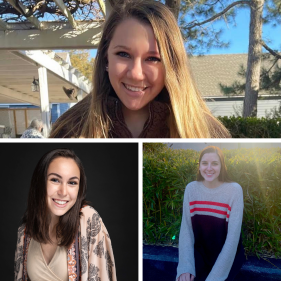Our biggest goal was to foster an inclusive environment.

This Humans of Hillel story featured three students from Virginia Polytechnic Institute and State University. The photo features, clockwise and starting from the top, Julie Blitz, Julia Nathanson, and Briana Schwam.
“I shared an Instagram post…just saying what sororities can be doing better and Panhellenic to be more inclusive for Judaism and for all different ethnicities and races. But this was focusing on Judaism. And then Julie shared it and Julia shared it. And then so many other people were talking about it at Virginia Tech, and so many other sororities across the country were like ‘Oh my gosh, this is amazing. Can we talk about it?’ And then one of the Panhellenic executive members saw it and responded to me ‘I resonate with this so much. I’m a minority too. I want you to do something about it. And I will have your back.’ And that really sparked me, like ‘Wow I already have the support from Panhellenic.’
“So I sent an email to them just with all our different experiences, running down how they scheduled initiation for Yom Kippur and how during recruitment, Julie had a bad experience where when she said she was Jewish, a recruiter stopped talking to her and was very disrespectful in the way she acted. And those kinds of stories that no one really knows about. I brought them up to Panhellenic saying we want to work with them, and we want to make change happen. But we need their help.” — Briana Schwam, Virginia Tech
***
“When I posted [the Instagram post], a couple of girls from our sorority who are not Jewish reached out and were saying, ‘How can I help? How can I support you guys? I’ll just do the best that I can to help you guys,’ which really meant a lot because I was very hesitant going into the meeting with our execs, talking with our whole sorority about it the week before recruitment. I didn’t know how receptive people would be to it. But everyone was so nice and accepting. They told us afterwards that they were so happy that we had brought this up to them because it hadn’t been something they were aware of before. We talked to them about it, which is awesome that we were able to educate them on it so that we can be more inclusive about it and just educate people, not only our sorority but the Virginia Tech community in general about Judaism and how we can be more inclusive across campus.
“Julie and I, we’re both sophomores, so we have two more years with the whole recruiting process. Our biggest goal was to foster an inclusive environment. We told our personal experiences and stories to our chapter. We also just wanted to focus on the fact that what happened to us is in the past, and we just want to focus on how we can improve our chapter and all Panhellenic chapters at Tech. So girls who decide to rush or join other organizations on campus that are Jewish, or a minority in general, they feel genuinely welcomed and not tokenized in any way.” — Julia Nathanson, Virginia Tech
***
“I had the same fear as Julia and Briana, like ‘Oh my gosh, they’re going to think we’re accusing them of something. They’re going to hate us.’ And it was actually the complete opposite of that. Like when telling them that they scheduled our initiation for Yom Kippur and I had to miss some of Yom Kippur for that. They were like ‘We are so sorry.’ They had no idea. And that’s completely okay because not everyone knows. But I think the best part of that whole conversation was they were so grateful that we educated them because they didn’t know something that we were able to teach them about. They weren’t apologizing profusely. They were sorry, but they weren’t like ‘Really? You have to make our lives more difficult?’ They were so willing to make this change happen with us.
“Talking to our execs personally made me, and I hope I can speak for Julia and Briana on this, it made me feel more comfortable with our executive team. It made me feel like I was an actual voice in my sorority rather than just another member. Because I didn’t know these girls from a hole in the wall. They’re much older than me. I see them as superiors, authorities because they’ve been in Chi Omega so much longer than I have. I was always afraid to speak to them, but talking to them made me feel so included, and it made me feel really secure. Knowing that anything I said they were going to take into consideration and do something about because they genuinely care about all of their members and everyone’s feelings too.” — Julie Blitz, Virginia Tech